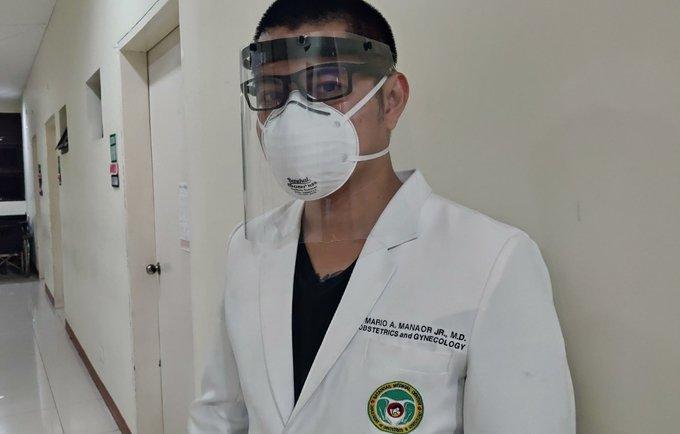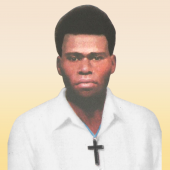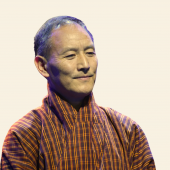Young doctor puts off going home to care for COVID-19 patients

It has been already one year since the Taal Volcano in Batangas city, Philippines, erupted on January 2020, affecting nearly 460,000 people within the 14-kilometer radius from the volcano, including 125,000 women of reproductive age.
Among them, more than 7,000 were expected pregnant when the volcano erupted.
Dr. Mario Manaor Jr., a 31-year-old doctor working in Batangas Medical Center, has not been home for months. Batangas Medical Center is located in the epicenter of the emergency of the Taal Volcano.
Since when Taal Volcano erupted, Doctor Mario has been sleeping in the hospital, instead of going home, in order to support his fellow doctors.
Again, because of COVID-19, Dr. Mario has decided to stay a little longer in the hospital, away from his family and home.
The family lived in Cavite, almost 83 kilometers away from the hospital.
Dr. Mario never imagined that he would experience such kind of challenge, especially at this early point of his career.
“I have to stay so that the junior residents know they have someone to lean on, even if it means I do not go home.” He always makes sure that he is available to the residents when they need his advice, especially if there are complications.
First volcano, and later pandemic too
All the hospitals within the radius became non-functional. “The number of our patients doubled. We accommodated patients from outside our province too, including Laguna and Cavite,” Dr. Mario recalls.
Then, only a couple of weeks later, on 30 January 2020, Philippines declared its first case of COVID-19, and the Batangas Medical Center has been assigned as a COVID-19 center by the Department of Health.
While the hospital refers normal deliveries to other hospitals, it still attends to those pregnant women who have comorbidities. Doctor Mario still could not go home.
Health and protection supply runouts
The Taal volcano tirelessly spewed smoke and ashes for weeks. The ashes reached as far as Metro Manila, the capital of the country, causing a supply run-out of masks.
The shortage has been compounded further as the number of COVID-19 confirmed cases soar globally and, in the Philippines, which has increased the demand for personal protective equipment including face masks, and makes these items even harder to acquire.
“No matter how hard you exert efforts, if you lack a facility or medicine or equipment, you cannot really cure your patients,” Dr. Mario voices out.
“When you as a medical service provider do not wear a mask or PPE, your patients may get anxious, thinking that you are carrying the Coronavirus. We don’t want to reach a point where a patient will be too scared to go to a hospital because of that anxiety. At the same time, we don’t want to see a situation where we as doctors will be too scared to deliver babies because of fear of getting sick due to lack of equipment. More importantly, we cannot spread the virus to our patients, colleagues, and family.”
Leaving no one behind
The United Nations Population Fund in the Philippines was among the first which provided masks to these front-liners in provincial and district hospitals, rural health units, and other medical facilities in Batangas. This donation of the masks is the continuous efforts to support the families affected by the Taal Volcano eruption.
“An OB doctor can’t tell a pregnant mother, ‘Wait, you cannot give birth right now, because there is a disaster or a pandemic.’ Pregnancies don’t stop, and deliveries cannot wait. So, in whatever situation, we have the responsibility to ensure clean and safe deliveries and good health of mothers and babies,” underscores Dr. Mario.
A week after the contribution of masks, UNFPA also delivered emergency tents to the Batangas Province, to expand hospital spaces for maternity care, protection of women and children, and triage for COVID-19 response. In addition, UNFPA provided hygiene kits as well to the pregnant and lactating women in the hospital.
UNFPA’s support was very timely. The emergency tents helped ensure the continuity of health services. The tents not only gave the much-needed additional space and equipment for the COVID-19 patients.
Seeing his patients safely home
“We feel upgraded. No matter what our challenges are, whether it is Taal or COVID-19, we are committed to overcoming them. But it is more achievable when you have a support system. Thank you, UNFPA, for giving us a sense of relief and hope,” Dr. Mario smiled behind the mask.
Dr. Mario looks forward to going back home and seeing his family. But he feels gratified just to send his patients safely to their homes.
By this time Dr. Mario may already have the chance to meet with his family, but no doubt that he quickly returns to his Medical Center and always makes sure that he is available to his patients and to his fellow doctors.
Source: United Nations Philippines
Radio Veritas Asia (RVA), a media platform of the Catholic Church, aims to share Christ. RVA started in 1969 as a continental Catholic radio station to serve Asian countries in their respective local language, thus earning the tag “the Voice of Asian Christianity.” Responding to the emerging context, RVA embraced media platforms to connect with the global Asian audience via its 21 language websites and various social media platforms.
















This is Dr. Mario A. Manaor Jr. If I may wpuld like to extend my appreciation to all of you, by giving me that oppprtunity to be part of your featured article.
Admittingly and I know all of us will agree, when I speak on behalf of everyone that the year 2020 is one of the most difficult years, of not the most probably during our lifetime.
And I thank God that we are still here, doing what we love the most, Saving Lives!
Thank you Again.
- Reply
Permalink